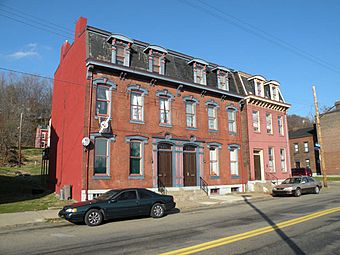Old Allegheny Rows Historic District facts for kids
Quick facts for kids |
|
|
Old Allegheny Rows Historic District
|
|

Near 904 California Avenue in the California-Kirkbride neighborhood of Pittsburgh, Pennsylvania
|
|
| Location | Roughly bounded by Sedgwick, California, Marquis, Mero, Brighton, and Moorison Streets (California-Kirkbride), Pittsburgh, Pennsylvania, USA |
|---|---|
| Architect | Herbert DuPuy |
| Architectural style | Romanesque Revival |
| NRHP reference No. | 84000349 |
| Added to NRHP | November 1, 1984 |
The Old Allegheny Rows Historic District is a special area in the California-Kirkbride neighborhood of Pittsburgh, Pennsylvania, United States. It's called a historic district because it has many old buildings that are important to the area's history. This district is known for its unique row houses that were built a long time ago.
Contents
What is a Historic District?
A historic district is like a special neighborhood where buildings, streets, and even parks are kept safe because they have historical importance. These places often show how people lived in the past or have a unique architectural style. The Old Allegheny Rows Historic District was officially recognized for its value.
The Row Houses of Old Allegheny
The houses in this district are mostly "row houses." This means they are built side-by-side in a row, often sharing walls with their neighbors. These specific row houses were built between about 1870 and 1900. They show us what homes looked like in Pittsburgh during that time.
A Place on the National Register
On November 1, 1984, the Old Allegheny Rows Historic District was added to the National Register of Historic Places. This is an official list kept by the United States government. Being on this list means a place is considered important to the history of the country. It helps protect these special places for future generations to enjoy and learn from.
Architecture and Design
Many of the buildings in this district show a style called Romanesque Revival. This architectural style was popular in the late 1800s. It takes inspiration from old Roman and medieval European buildings. You might see features like strong, thick walls, round arches over windows and doors, and sometimes decorative stone work.
One architect linked to this area is Herbert DuPuy. Architects are people who design buildings. His work helped shape the look of some of the structures in the district.
Images for kids



